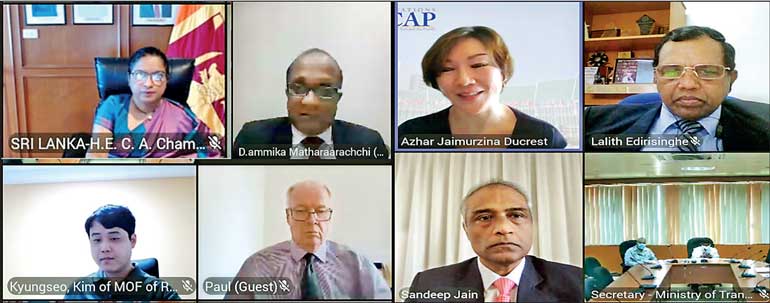Saturday Feb 21, 2026
Saturday Feb 21, 2026
Monday, 12 July 2021 00:00 - - {{hitsCtrl.values.hits}}

A national consultation workshop on a strategy for sustainable freight transport in Sri Lanka was virtually held by the United Nations Economic and Social Commission for Asia and the Pacific (UNESCAP), Embassy and the Permanent Mission of Sri Lanka in Bangkok and the Ministry of Transport of Sri Lanka, on 5 July.
Making opening remarks at the workshop, the Chief of the Transport Connectivity and Logistics Section of the Transport Division of UNESCAP Azhar Jaimurzina assured that UNESCAP would render necessary technical assistance in implementing the strategy for sustainable freight transport in Sri Lanka in order to maximise the positive externalities of freight transport.
In her opening remarks, Ambassador and Permanent Representative of Sri Lanka to Thailand C.A. Chaminda I. Colonne appreciated the efforts taken by the UNESCAP in conducting the assessment on sustainable freight transport in Sri Lanka and developing the national strategy.
Secretary of the Ministry of Transport of Sri Lanka Monty Ranatunge welcomed the initiative of the UNESCAP to organise the national consultation on sustainable freight transport. He further appreciated the draft of the strategy prepared by the UNESCAP for consultations. He concurred with strategic thrust areas identified in the strategy and highlighted need for increasing the role of railway transport by undertaking restructuring of railways in Sri Lanka.
The UNESCAP Economic Affairs Officer Sandeep Jain elaborated on the strategy. Explaining on the rationale for strategy on sustainable freight transport he stated that it would help Sri Lanka to provide coherence to sustainable freight transport measures that are currently fragmented and scattered. The strategy would help implement Sri Lanka’s international obligations particularly- the United Nations Sustainable Development Goals.
The draft strategy has identified seven focus areas that include increasing role of railway transport, improving intermodal freight transport, transforming Sri Lanka into a global maritime hub, building resilience of transport to climate change impacts, enhancing sustainability of road transport, addressing urban freight transport challenges, and expanding role of women in transport sector in Sri Lanka.
It also identified five enablers that would help implement strategy including strengthening of governance for sustainable freight transport, building capacity of transport policy makers, promoting transformative transport technologies, encouraging private sector participation, and diversifying funding source for sustainable freight transport.
The workshop also included a representative from the Ministry of Oceans and Fishing of Republic of Korea who shared the experience of port policies and how Sri Lanka could learn from them. The representatives of Asian Institute of Transport Development (AITD) also shared their views on challenges faced by Sri Lanka railways and how to boost the role of railway transport in Sri Lanka. The President of the Infrastructure Economic Centre based in Moscow explained how understanding of freight flows post pandemic would become important component for appropriate planning and investments in transport infrastructure in Sri Lanka.
The workshop agreed that the draft strategy would be finalised soon after consultations with relevant stakeholders and then after government endorsement/adoption would be taken up for implementation.
Secretary of the State Ministry of Warehouse Facilities, Container Yards, Port Supply Facilities and Boat and Shipping Industry Development D. Mataraarachchi, and other senior officials from Ministry of Highways, Ministry of Ports and Shipping, Sri Lanka Ports Authority and Sri Lanka Railway also joined the discussions. Prof. Lalith Edirisinghe from the CINEC Maritime Campus, Sri Lanka shared the views representing the non-government sector. First Secretary and Deputy Permanent Representative Saritha Ranatunga also joined from the Embassy.